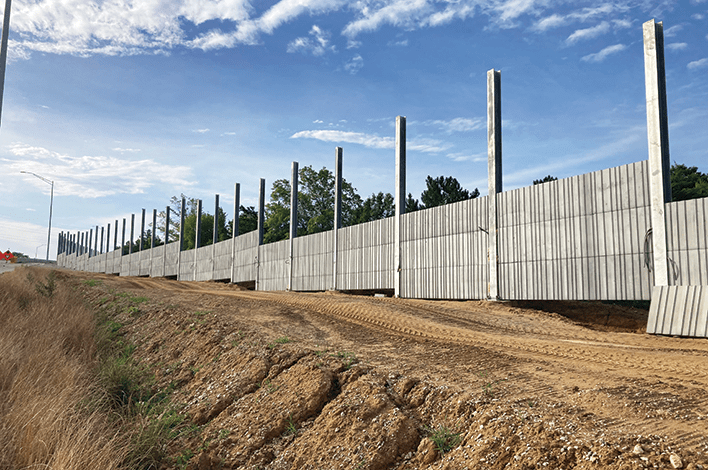Overland Park is one of the largest cities in Kansas, with a population of nearly 200,000 in 2020. It’s also one of the state’s fastest growing cities, with new residents flocking there to settle in the suburbs. As a result, traffic on U.S. 69, one of the city’s main arteries, became more congested, increasing motorists’ commute time to the city. Highway safety was a major concern.
To deal with the congestion, the Kansas Department of Transportation (KDOT) authorized a seven-mile, full-road highway reconstruction stretching from 103rd Street to 167th Street. A toll express lane will be added in both directions. Vehicles can merge in and out of the express lane at designated access points and are electronically billed for the time they drive on it. U.S. 69 is the first highway in the state to implement this innovative system.
Precast sound walls will alleviate noise from the traffic. More than 30 bridges as well as storm sewer and sanitary structures will be reconstructed as well.
The 69 Express Project also includes widening six interchanges to handle additional capacity, creating trails, sidewalks and other safety features, which are under the city’s jurisdiction.
US69 Express Constructors, a joint venture between Ames Construction in Burnsville, Minnesota, and Emery Sapp & Sons in Columbia, Missouri, is charged with completing the design-build project. The project broke ground in March 2023.
“This is the largest public works project in the history of the state,” said Benjamin Bryant, project engineer with Ames Construction/US69 Constructors. “It’s also the largest design-build project that the state’s ever done.”
TAKING ADVANTAGE OF NEW OPPORTUNITIES
Kansas-City based Pretech Corp. was awarded the bid to supply the precast for the project. It is Pretech’s biggest project to date, too.
The use of precast concrete for these items is standard for KDOT.
The precast elements include:
- More than 620 inlets and junction boxes ranging in size from 3 feet by 2 feet to 10 feet by 9 feet.
- More than 51,000 feet of reinforced concrete pipe from 15-inch Class III to 60-inch Class V.
- Approximately 3,050 feet of reinforced concrete box culverts from single 4-foot-by-4-foot to quad 11-foot-by-11-foot for the storm sewer.
- Nearly 15,000 (600,000 square feet) prestressed concrete sound wall panels of various sizes, with the largest measuring 14 feet, 8 inches by 3 feet. Some were as thick as 7.25 inches and weighed up to 3,600 pounds.
Pretech mainly specializes in utility jobs — pipe, inlets and culvert. The company had never produced prestressed concrete sound wall panels. To meet the project demands, Pretech needed a new plant to accommodate the job. Fortunately, a substantial lead time made this possible.
“One of the challenges was starting a new facility from scratch,” said Mike Bundschuh, vice president of Pretech, who considers it an opportunity to expand. An existing manufacturing facility in Tonganoxie, 20 miles from Pretech’s main plant in Kansas City, was procured and refitted as a precast plant to fabricate the panels.
All other precast products were fabricated at Pretech’s main plant in Kansas City.
Prestressing the sound panels, something else Pretech had never done before, posed another challenge. Again, the company was up to the challenge.
“It wasn’t that painful,” Bundschuh said. “It was just a matter of getting a few people certified.”
By the fall of 2023, the new plant was ready, the workers were trained, and production of the 7 miles of sound panels began.
“This type of project is right up our alley,” Bundschuh said. “The job’s going well, and it gave us the ability to open another facility.”
The first precast sound panels were shipped 40 miles to the job site in April 2024. Pretech fabricated racks specifically for transportation of the panels. Each rack holds three. The racks are loaded on standard-sized flatbed trucks.
“These racks also allow us to carry the panels around on-site, allowing quicker delivery,” Bryant said. “Once the panel racks are empty, they are loaded back onto the trucks and returned to Pretech’s plant where they are reused for the next load.”
